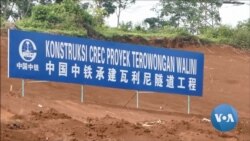ຈີນ ໄດ້ສະແດງຄວາມຮູ້ສຶກລຳຄານ ຕໍ່ການທີ່ສະຫະລັດ ຕຳໜິຕິຕຽນໂຄງການນຶ່ງແລວ
ທາງນຶ່ງເສັ້ນທາງຂອງຕົນ ທີ່ໄດ້ຮັບແຮງດົນໃຈມາຈາກເສັ້ນທາງສາຍໄໝ ເຄືອຄ່າຍເສັ້ນທາງເກົ່າແກ່ ດ້ານການຄ້າຂາຍທີ່ເຊື່ອມຕໍ່ຫຼາຍໆພາກສ່ວນຂອງເອເຊຍ ອາຟຣິກາແລະ
ຢູໂຣບ. ລັດຖະບານຂອງທ່ານ ສີ ຈິ້ນຜິງ ໄດ້ສົ່ງເສີມໂຄງການລິເລີ້ມນີ້ວ່າໃຫ້ເປັນຍຸທະ
ສາດການພັດທະນາທີ່ພົວພັນກັບການລົງທຶນແລະ ການກໍ່ສ້າງໂຄງລ່າງພື້ນຖານຢູ່ ໃນຫຼາຍກວ່າ 150 ປະເທດ. ພວກຕໍນິວິຈານທັງຫລາຍເວົ້າວ່າໂຄງການລິເລີ້ມ ນຶ່ງແລວທາງ ນຶ່ງເສັ້ນທາງນີ້ ມີຈຸດປະສົງທີ່ຈະສົ່ງເສີມອິດທິພົນຂອງຈີນ ແທນທີ່ຈະແມ່ນການພັດທະ
ນາ. ທ່ານໄມຄ໌ ພອມພຽວ ລັດຖະມົນຕີການຕ່າງປະເທດສະຫະລັດໄດ້ເຕືອນວ່າ ການນຳ
ໃຊ້ເງິນກູ້ຂອງຈີນທີ່ບໍ່ໂປ່ງໃສ ອາດເປັນການວາງກັບດັກ ໃສ່ປະເທດທັງຫຼາຍ ທີ່ມີໜີ້ສິນ
ຫລາຍຈົນອາດບໍ່ສາມາດຈ່າຍຄືນໄດ້ນັ້ນກໍເປັນໄດ້ ດັ່ງທີ່ວັນນະສອນ ຈະນຳລາຍລະອຽດ
ຈາກຊລາຕິກາ ໂຮກ ນັກຂ່າວຂອງວີໂອເອ ມາສະເໜີທ່ານ ໃນອັນດັບຕໍ່ໄປ.
ໂຄງການລິເລີ້ມ ນຶ່ງແລວທາງນຶ່ງເສັ້ນທາງຂອງຈີນ ເປັນໂຄງການທີ່ທະເຍີ້ທະຍານທີ່ສຸດ
ຂອງນາໆຊາດ ໂດຍການໃຫ້ຄຳໝັ້ນສັນຍາເຖິງຜົນກຳໄລສຳລັບພວກປະເທດທີ່ຮັ່ງມີ
ແລະຖືວ່າເປັນການພັດທະນາສຳລັບປະເທດຍາກຈົນນັ້ນ ຊຶ່ງມັນໄດ້ດຶງດູດເອົາຜົນ
ປະໂຫຍດຢ່າງໃຫຍ່ມາໃຫ້.
ທ່ານ Ueli Maurer, ປະທານຂອງ Swiss Confederation ກ່າວເປັນພາສາອັງກິດວ່າ:
“ຂ້າພະເຈົ້າຄິດວ່າ ໂຄງການທີ່ສຳຄັນທີ່ສຸດຄືການລົງທຶນ ໃນທົ່ວໂລກ ໃນຮອບ
100 ປີ ຕໍ່ໜ້າ. ນັ້ນແມ່ນວິໄສທັດທີ່ເຂົ້າທ່າ ແລະຂ້າພະເຈົ້າຄິດວ່າ ທັງໂລກ ຈຳເປັນ
ຈະຕ້ອງມີໄດ້ມີວິໄສທັດບາງຢ່າງ.”
ທ່ານ Jean-Pierre Raffarin, ອະດີດນາຍົກລັດຖະມົນຕີຝຣັ່ງກ່າວວ່າ“ຖ້າຫາກວ່າ
ຈີນກັບ ຝຣັ່ງ ເຮັດວຽກຮ່ວມກັນ ດ້ວຍປະສົບການທີ່ແຕກຕ່າງກັນຂ້າພະເຈົ້າຄິດວ່າ
ພວກເຮົາຈະສາມາດສົ່ງເສີມໂຄງການໃໝ່ນີ້ ດ້ວຍໂອກາດໃໝ່ໆ ມາກມາຍ
ໃນຫຼາຍໆປະເທດ ເຊັ່ນ ອາຟຣິກາເປັນຕົ້ນ.”
ແມ່ນແຕ່ ທ່ານ Antonio Guterres ເລທິການໃຫຍ່ ອົງການສະຫະປະຊາຊາດ
ກໍສົນໃຈ ຕໍ່ການເລີ້ມຕົ້ນອັນນີ້ຂອງຈີນ ໃນຂະນະທີ່ທ່ານໄດ້ພົບຄວາມຫຍຸ້ງຍາກ
ລຳບາກ ໃນການທີ່ຈະນຳເອົາຈຸດປະສົງຂອງອົງການສະຫະປະຊາຊາດໄປ ດຳເນີນ
ຢ່າງໃຫ້ວ່ອງໄວ.
ທ່ານ Antonio Guterres ເລຂາທິການໃຫຍ່ ອົງການສະຫະປະຊາຊາດກ່າວວ່າ
“ເສົາຄໍ້າທັງ 5 ຂອງໂຄງການນຶ່ງແລວທາງນຶ່ງເສັ້ນທາງ ຜູ້ປະສານງານນະໂຍບາຍ,
ການຕິດຕໍ່ເຂົ້າເຖິງສະຖານຕ່າງໆ, ການຄ້າທີ່ບໍ່ມີກົດບັງຄັບ, ການເງິນທີ່ປະສົມ
ປະສານ,ແລະການແລກປ່ຽນລະຫວ່າງຜູ້ຄົນ ຕໍ່ຜູ້ຄົນນັ້ນແມ່ນພື້ນຖານ ທີ່ໄດ້ເຊື່ອມຕໍ່
ກັບ ຈຸດປະສົງຂອງການພັດທະນາຍືນຍົງ 17 ໂຄງການ. ທັງໝົດນີ້ແມ່ນແບບແຜນ
ຂອງເສົາຄໍ້າ ທີ່ສາມາດຕີຄວາມໝາຍໄດ້ໃຫ້ເປັນຂັ້ນຕອນການດຳເນີນງານຂອງ
ຊີວິດອັນແທ້ຈິງຂອງແຕ່ລະຄົນ.”
ແຕ່ວ່າບໍ່ແມ່ນວ່າທຸກໆຄົນຈະໝັ້ນໃຈ. ການສົງໄສອ້ອມຂ້າງຈີນ ບໍ່ໄດ້ສົນໃຈ ກັບການ
ພັດທະນາ, ແຕ່ແມ່ນການເພີ້ມມີອິດທິພົນຂອງຕົນ ໃນທົ່ວໂລກ. ລັດຖະມົນຕີການຕ່າງ
ປະເທດສະຫະລັດ ທ່ານໄມຄ໌ ພອມພຽວໄດ້ວາດພາບຈີນ ວ່າ ເປັນພາຄີທຸລະກິດທີ່
ເຊື່ອຖືບໍ່ໄດ້ ໃນຊ່ວງ ທີ່ໄດ້ໄປຢ້ຽມຢາມນະຄອນລອນດອນ ໃນວັນພຸດຜ່ານມານີ້.
ທ່ານໄມຄ໌ ພອມພຽວ ກ່າວວ່າ “ຈີນ ຊຸກຍູ້ພື້ນຖານໂຄ່ງລ່າງ ທີ່ສໍ້ລາດບັງຫຼວງເພື່ອ
ແລກປ່ຽນກັບອິດທິພົນທາງການເມືອງ. ຈີນ ໄດ້ຊື້ຈ້າງຈອບອອຍ, ເຮັດກັບດັກໜີ້ສິນ
ທາງການທູດ ທີ່ເປັນບ່ອນທຳລາຍການປົກຄອງທີ່ດີ ແລະໄດ້ຂົ່ມຂູ່ເພື່ອໂຄ່ນລົ້ມ
ເສດຖະກິດທີ່ເສລີ ທີ່ປະເທດທັງຫຼາຍ ກາງຕໍ່ ຊຶ່ງໄດ້ຍົກເອົາຜູ້ຄົນຫຼາຍຮ້ອຍລ້ານຄົນ
ອອກຈາກຄວາມຍາກຈົນ.”
ກະຊວງການຕ່າງປະເທດຂອງຈີນ ໄດ້ຕຳໜິຕິຕຽນຢ່າງໂກດແຄ້ນ ໃນວັນພະຫັດ
ຜ່ານມານີ້. ທ່ານ Geng Shuang ລັດຖະມົນຕີການຕ່າງປະເທດຂອງຈີນ ກ່າວວ່າ
“ພວກເຂົາເຈົ້າ ບໍ່ເມື່ອຍໃນການເວົ້າເຖິງເລຶ້ອງພວກນີ້ເບາະ, ແຕ່ວ່າພວກເຮົາແມ່ນ
ເມື່ອຍທີ່ໄດ້ຍິນມັນແລ້ວ?”
ໂຄສົກກະຊວງການຕ່າງປະເທດ ໄດ້ຍົກຍ້ອງຜົນສຳເລັດ ຂອງໂຄງການນຶ່ງແລວທາງ
ນຶ່ງເສັ້ນທາງ ໃນເດືອນແລ້ວນີ້ ທີ່ນະຄອນປັກກິ່ງ.
ທ່ານ Geng Shuang ໂຄສົກກະຊວງການຕ່າງປະເທດຂອງຈີນ ກ່າວວ່າ “ມີພວກ
ຜູ້ແທນ 6 ພັນຄົນ ຈາກ 150 ປະເທດ ແລະ 92 ອົງການນາໆຊາດ ທີ່ເຂົ້າຮ່ວມ
ໃນກອງປະຊຸມ ໂຄງການນຶ່ງແລວທາງນຶ່ງເສັ້ນທາງ ສຳລັບການຮ່ວມງານນາໆຊາດ
ທີ່ຮວມທັງມີຕົວແທນຫຼາຍກວ່າ 50 ຄົນ ໄປຈາກສະຫະລັດ.”
ສະຫະລັດ ແລະຈີນ ໃນຫວ່າງມໍ່ໆມານີ້ ໄດ້ພົວພັນກັນ ໃນການເຈລະຈາທາງການຄ້າຢ່າງເອົາຈິງເອົາຈັງ, ແຕ່ວ່າ ລັດຖະບານຂອງທ່ານທຣຳ ໄດ້ເອົາບາດກ້າວຕໍ່ໄປຂ້າງໜ້າ
ໃນວັນສຸກມື້ນີ້ແລ້ວ ໂດຍການເພີ້ມພາສີໃໝ່ເຂົ້າໃສ່ສິນຄ້ານຳເຂົ້າຂອງຈີນ.
ອ່ານຂ່າວນີ້ເພີ້ມຕື່ມເປັນພາສາອັງກິດ
China has expressed annoyance over U.S. criticism of its Belt and Road Initiative, inspired by the Silk Road, an ancient network of trade routes that connected parts of Asia, Africa and Europe. Xi Jinping's administration has promoted the initiative as a development strategy involving investment and building infrastructure in more than 150 countries. Critics say the Belt and Road Initiative aims to promote Chinese influence rather than development. U.S. Secretary of State Mike Pompeo has warned that China's opaque financing could trap many countries in unsustainable debt. VOA'S Zlatica Hoke reports.
The Belt and Road initiative is currently China's most ambitious international project. With promises of financial profits for rich countries and development for the poor, it has attracted considerable interest.
Ueli Maurer, president, Swiss Confederation
"I think that's the most important project for investments in the world for the next 100 years. That's the sense of this vision, and I think the world needs some visions."
Jean-Pierre Raffarin, former French prime minister:
"If China and France together are working with their different experiences, I think we can promote new projects with a lot of new opportunities in many countries, for example in Africa."
Even United Nations chief Antonio Guterres is interested in China's initiative as he struggles to bring U.N. development goals up to speed.
Antonio Guterres, Secretary-General of the United Nations:
"The five pillars of the Belt and Road — policy coordination, facilities connectivity, unimpeded trade, financial integration, and people-to-people exchanges — are intrinsically linked to the 17 Sustainable Development Goals. These are conceptual pillars that can be translated into real-life progress for every people."
But not everyone is convinced. Suspicions abound that China does not care about development, but about increasing its global influence. U.S. Secretary of State Mike Pompeo portrayed China as an unreliable business partner during a visit in London on Wednesday.
Mike Pompeo, USSecretary of State:
"China peddles corrupt infrastructure deals in exchange for political influence. Its bribe-fueled, debt-trap diplomacy undermines good governance and threatens to upend the free economic model on which so many countries depend, and which has lifted up hundreds of millions of people out of poverty. "
China's foreign ministry lashed out angrily on Thursday.
Geng Shuang, Chinese foreign ministry spokesman:
"They aren't tired of saying this, but we are tired of hearing this."
A foreign ministry spokesman praised the success of last month's Belt and Road Forum in Beijing.
Geng Shuang, Chinese foreign ministry spokesman:
"A total of 6,000 delegates from 150 countries and 92 international organizations attended the second Belt and Road Forum for International Cooperation, including more than 50 representatives from the U.S."
The United States and China are currently engaged in tough trade negotiations, but the Trump administration has gone ahead Friday with tough new tariffs on Chinese imports.





